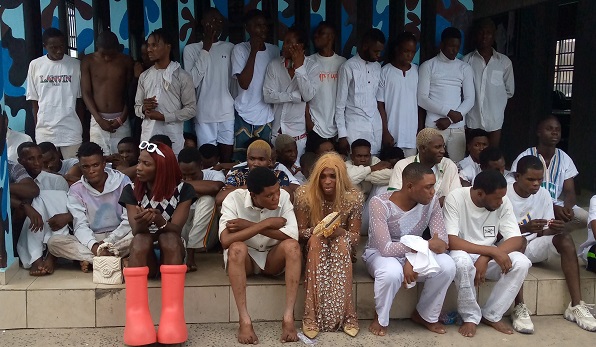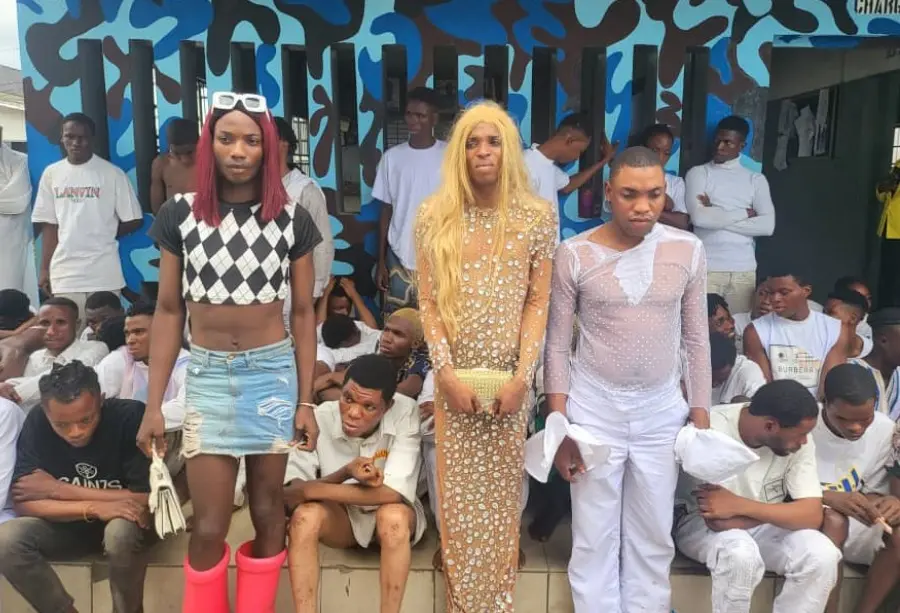
Why 100 suspects carrying out gay wedding ceremony’ll be prosecuted

Gay marriage is prohibited by law in Nigeria therefore to that extent , the over 100 gay suspects carrying out a gay wedding ceremony arrested by the Delta State Police Command have violated Same Sex Marriage (Prohibition) Act of 2013 and are liable for prosecution.
According to the police, the suspects were allegedly carrying out the gay wedding ceremony in a hotel in Delta State.

In a post on its official X (formerly Twitter) handle, the state police command said it would parade the suspects shortly.

The post read: “Delta State Command has arrested over a hundred gay suspects in a hotel carrying out a gay wedding ceremony. We will be going live shortly on Facebook to parade the said suspects.”
Besides the Delta State incident , reports say that in December 2020, the Lagos State Police Command arrested 10 individuals suspected of homosexual activities in a brothel located in the Okota area of the state.
Also in 2018, the police in the state also paraded 57 men for alleged homosexual activities at Kelly Ann hotel in Egbeda. In January 2022, eight alleged homosexuals were arrested in a hotel in Isolo, also in Lagos for alleged gay activities.
Nineteen young people were also arrested in 2022 in Kano for allegedly attending a same-sex wedding.
Recall that former President Goodluck Jonathan had during his time in office, signed a bill into law that criminalises same-sex relationships, defying Western pressure over gay rights and provoking US criticism.

The bill, which contains penalties of up to 14 years in prison and bans gay marriage, same-sex “amorous relationships” and membership of gay rights groups, was passed by the National Assembly in May 2013 but Jonathan had delayed signing it into law.
Under existing Nigerian federal law, sodomy is punishable by jail, but the 2013 Actl legislates for a much broader crackdown on homosexual people, who live a largely underground existence.
Therefore , the action of these suspects arrested by the security agency is a flagrant violation of Same Sex Marriage (Prohibition) Act of 2013 which prohibits a marriage contract or civil union entered into between persons of same sex, and provides penalties for the solemnisation and witnessing of same thereof.
The Act states as follows:
1 . A marriage contract or civil union entered into between persons of same sex:
(a) is prohibited in Nigeria; and (b) shall not be recognised as entitled to the benefits of a valid marriage;
(2) A marriage contract or civil union entered into between persons of same sex by virtue of a certificate issued by a foreign country is void in Nigeria, and any benefit accruing there-from by virtue of the certificate shall not be enforced by any court of law.
2. (1) A marriage contract or civil union entered into between persons of same sex shall not be solemnized in a church, mosque or any other place of worship in Nigeria;
(2) No certificate issued to persons of same sex in a marriage or civil union shall be valid in Nigeria.
3. Only a marriage contracted between a man and a woman shall be recognized as valid in Nigeria.
4. (1) The Registration of gay clubs, societies and organisations, their sustenance, processions and meetings is prohibited.
(2) The public show of same sex amorous relationship directly or indirectly is prohibited.
5 (1) A person who enters into a same sex marriage contract or civil union commits an offence and is liable on conviction to a term of 14 years imprisonment.

(2) A person who registers, operates or participates in gay clubs, societies and organisation, or directly or indirectly makes public show of same sex amorous relationship in Nigeria commits an offence and is liable on conviction to a term of 10 years imprisonment.
(3) A person or group of persons who administers, witnesses, abets or aids the solemnization of a same sex marriage or civil union, or supports the registration, operation and sustenance of gay clubs, societies, organisations, processions or meetings in Nigeria commits an offence and is liable on conviction to a term of 10 years imprisonment.
The High Court of a State or of the Federal Capital Territory shall have jurisdiction to entertain matters arising from the breach of the provisions of this Act.



